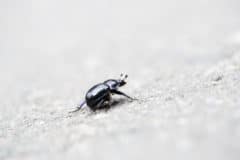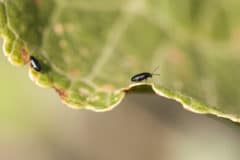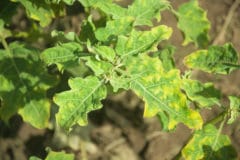Recognizing Eggplant Flea Beetles
Many species of flea beetles attack nightshade plants, but the most common one that infests eggplant is (Epitrix fuscula). If you see black, oval insects that are about one-tenth inches long, and jump with their back legs, then your eggplants have flea beetles. You might also see white larvae that have brown heads, and three pairs of legs near their heads. When these pests eat eggplant foliage, they leave tiny, shotgun type holes behind.
How to Prevent Flea Beetles
If you haven’t planted your eggplants yet, delay your planting until the eggplant seedlings grow larger. By delaying planting time, your transplants have the strength to tolerate flea beetles. Eggplant seedlings infested with flea beetles don’t usually survive, but more mature plants can tolerate them, and still bear fruit.
Hanging row covers over your eggplant transplants is another organic control method that prevents flea beetles from getting into your eggplants. Make sure the cover is completely sealed by covering all the edges with soil. Check your plants every day to make sure the insects are not getting through the cover.
How to Get Rid of Flea Beetles Organically
Once you’ve determined that your eggplants have flea beetles, you can control them with organic solutions.
- Remove debris, such as crop residue, leaves, sticks and grass clippings that provide shelter for garden pests.
- Weed around the eggplants, eliminating extra food supplies for beetles.
- Hang sticky traps around your rows of eggplants, replacing them throughout the growing season.
- Plant trap crops and companion plants surrounding your garden. These plants attract or repel the flea beetles, preventing them from moving on to the eggplants. Mustard, broccoli, kale and cabbage work well as trap crops.
- Scout your eggplants daily for flea beetles, removing as many larvae and beetles as possible.
- Apply organic mulch, such as barley straw or plastic mulch around your eggplants. This interferes with the soil-stages of flea beetles, and inhibits laying eggs.
Taking advantage of these organic flea beetle control methods will help your eggplants produce healthy foliage and bountiful fruit. Try to avoid pesticides, keeping your plants, fruit and soil safe from harmful chemicals.












